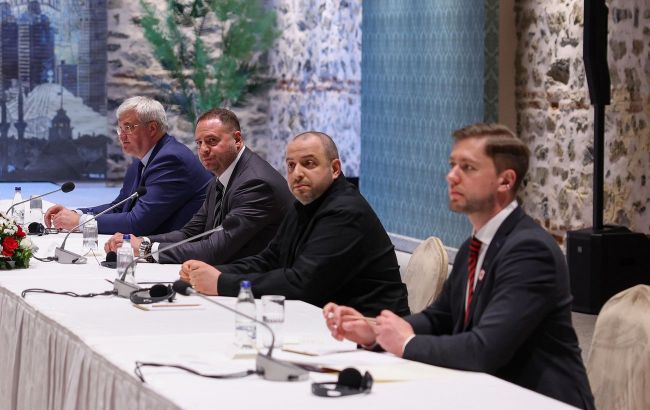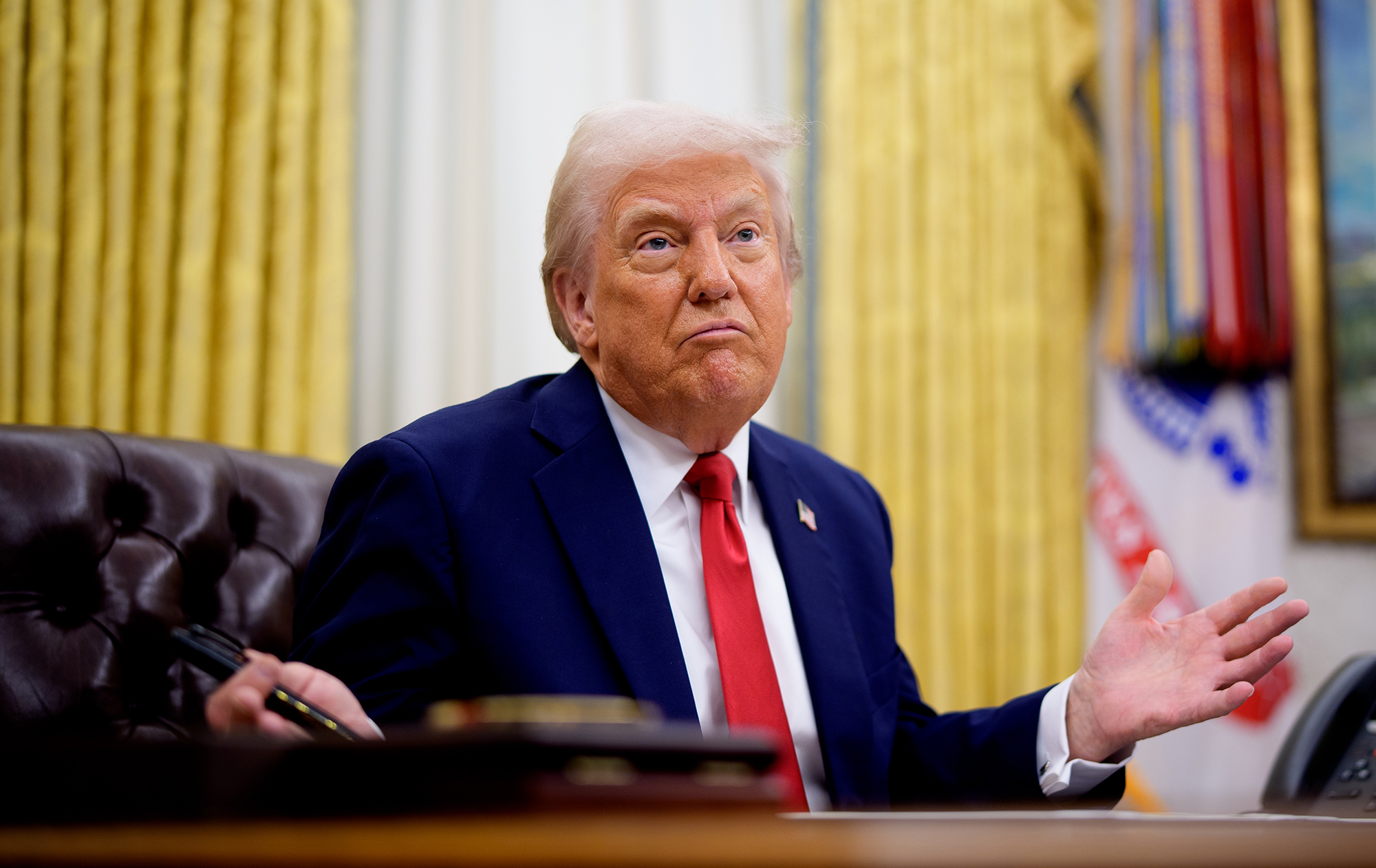As Putin maneuvers, Trump sets deadlines. Will Istanbul talks deliver real results?
 Ukrainian delegation at the talks in Istanbul (photo: Getty Images)
Ukrainian delegation at the talks in Istanbul (photo: Getty Images)
What positions Ukraine and Russia are taking into the new round of negotiations in Istanbul, and when Donald Trump might finally decide to impose sanctions against the aggressor state - read in the column by Milan Lelich, RBC-Ukraine Deputy Editor-in-Chief.
Key questions:
- Why does Trump keep setting and moving deadlines for Putin?
- Why does the situation ahead of the Istanbul meeting seem less bleak than it did a week and a half ago?
- Is there any hope that Ukraine-Russia talks will yield tangible results?
"I’ll let you know in about two weeks," — that was the deadline Donald Trump set on May 28 in response to a question about whether Vladimir Putin wants to end the war.
This statement could be taken seriously if Trump hadn’t already set exactly the same two-week deadline in mid-May, and before that, at the end of April. And before that, he spoke of a "psychological deadline" in late March without a specific timeframe. And in between, he even said there were no deadlines at all. And if the US media hadn't discovered back during his first presidential term that "two weeks" is Trump's favorite deadline for solving any issue — from taxes to the fight against ISIS.
Whether Trump moves his deadline again, cancels it altogether, lashes out with new accusations against Ukraine, Russia, or both — or says nothing at all — we’ll find out after the second round of Ukraine-Russia negotiations in Istanbul takes place on June 2.
Is Trump tired?
Since the last meeting in Istanbul on May 16, not much diplomacy has happened. The most potentially significant event of recent weeks — a phone call between Trump and Putin brought no visible results. According to multiple RBC-Ukraine sources in both Ukrainian and European political and diplomatic circles, European leaders were not just disappointed — some were even shocked.
The expectations were clear. Trump keeps demanding an end to the slaughter in Ukraine. Ukraine reiterates daily that it's ready to end the war immediately and unconditionally. Russia, meanwhile, drags the process out and keeps putting forward demands. So who, under these conditions, really doesn't want peace? The answer would seem obvious. But it isn't.
The only more or less clear outcome from the Trump-Putin call was that the White House occupant is clearly exhausted by the situation and is even considering withdrawing from the Ukraine-Russia issue entirely. That's how the situation was interpreted in Kyiv and other European capitals.
 Donald Trump (photo: Getty Images)
Donald Trump (photo: Getty Images)
Moreover, there is growing talk that Trump's true priority isn't ending the Russia-Ukraine war but launching large-scale business cooperation with Russia. Many suspected this before, but it was believed that one condition was necessary — Russia's aggression against Ukraine had to end first.
Now, it seems that condition might not be necessary: buying, selling, and extracting resources can continue even while fighting goes on — as long as Moscow maintains at least the appearance of peace talks.
Pressure on the Kremlin
Still, on the eve of the new meeting in Istanbul, the situation does not look so bleak. The US hasn't slammed the door shut; top Trump administration officials remain actively engaged with Europeans and are publicly commenting on developments — as is Trump himself.
After taking another jab at Zelenskyy, Trump has taken a noticeably tougher stance toward Putin in recent days. US senators — even from Trump's circle — are becoming increasingly vocal in support of anti-Russian sanctions. Pressure on the aggressors is mounting from all sides, including Europe.
So although Putin's press secretary Peskov claimed that there can be no talk of deadlines for preparing Russia's peace memorandum, the Russians have started moving — albeit in their usual way: dragging their feet, twisting facts, and outright lying. For example, they promised to send their "memorandum" to both Ukraine and the West — but now insist they'll present it only on-site, in Istanbul.
The reason for such behavior is clear to everyone except one major world leader: Russia wants to keep fighting as long as — at least in its own estimation — there are conditions, capabilities, and hopes for success on the ground.
Of course, you can't put that in a "peace memorandum," so the Russians orchestrated a controlled leak to global media of their possible demands in Istanbul: no NATO expansion eastward, Ukrainian neutrality, protection of Russian-language speakers, and so on. A classic trial balloon to gauge official and informal reactions and, if necessary, adjust their talking points before showing up in Istanbul.
What exactly will appear in the document will become clear only on Monday, but it's almost certain that the aggressors' demands will far exceed Ukraine's "red lines."
The never-ending deadline
Judging by the previous round, the atmosphere at the Istanbul talks will be extremely tense. But just as intense will be the post-talks struggle over how the results are interpreted. Most importantly, how the outcome is presented to the key overseas audience.
Trump is unlikely to be concerned with the details of mutual demands, like who monitors the ceasefire, how far and in which direction troops must withdraw, which Ukrainian laws the aggressors want to be changed, and whether that's even feasible. Yet the effectiveness of any ceasefire — not even a full peace deal — depends precisely on such details. But in Trump's binary worldview of "good deal" vs. "bad deal," there's no room for nuance. And the Russians are sure to exploit this.
The success of the Istanbul talks may depend on who last manages to shape Trump's opinion about them — whether it's someone like Marco Rubio or Steve Witkoff. And how long that opinion even lasts. Several RBC-Ukraine sources believe that starting Monday, events will again accelerate.
The process will move forward. However, real progress is unlikely, given that both sides are pursuing completely opposing, mutually exclusive goals: Ukraine seeks a ceasefire, while Russia wants to continue the war. Unless, of course, Trump finally dares to shift the balance of power with his nuclear sanctions. But for that, the US president still needs to reach a decision. How long that will take is impossible to predict, because in Trump's world, "two weeks" ends not in 14 days, but whenever he decides it does.



